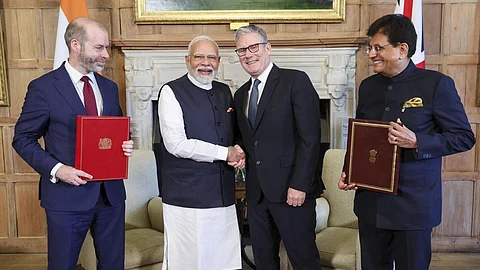

New Delhi | The India-UK free trade agreement (FTA) does not mandate patent term extensions or data exclusivity, which are two common tools of evergreening of patents, according to a commerce ministry document.
The move would protect the interests of the domestic generic drugs industry.
The UK was demanding for inclusion of "data exclusivity" provision in the agreement.
"The FTA does not mandate patent term extensions or data exclusivity -- two common tools of evergreening. India's patent law provisions on patentability criteria under Section 3(d) (of Indian Patent Act) remain fully protected," the ministry said.
Section 3(d) of the Indian Patents Act, 1970, restricts patents for already-known drugs unless the new claims are superior in terms of efficacy, while Section 3(b) bars patents for products that are against public interest and do not demonstrate enhanced efficacy over existing products.
Certain multinational firms have asked India to amend these laws, which were strongly opposed.
The agreement, signed on July 24, may take about a year to come into force.
Data exclusivity provides protection to the technical data generated by innovator companies to prove the usefulness of their products. In the pharmaceutical sector, drug companies generate data through expensive global clinical trials to prove the efficacy and safety of their new medicine.
By gaining exclusive rights over this data, innovator companies can prevent their competitors from obtaining a marketing licence for low-cost versions during the tenure of this exclusivity.
Earlier, India had also rejected a similar demand from the four-nation EFTA bloc in their free trade agreement negotiations.
The European Free Trade Association (EFTA) members are Iceland, Liechtenstein, Norway, and Switzerland. The pact was signed in March 2023 and will be implemented later this year.
The UK (AstraZeneca and GSK) and Switzerland (Novartis and Roche) have some of the major pharma firms of the world.
India's generic drug industry is estimated about USD 25 billion, and the country exports 50 per cent of its produce.
An expert said data exclusivity is beyond the provisions of the Trade Related Aspects of Intellectual Property Rights (TRIPS) agreement under the World Trade Organization (WTO).
Evergreening of patent rights is a strategy allegedly adopted by the innovators having patent rights over products to renew them by bringing in some minor changes, such as adding new mixtures or formulations. It is done when their patent is about to expire. A patent on the new form gives the innovator company a 20-year monopoly on the drug.
"The FTA does not require India to provide patent term extensions for regulatory delays and data exclusivity for pharmaceuticals or agrochemicals," it said, adding that this ensures that generic manufacturers can enter the market without unnecessary delay, once the patent has expired or is challenged.
The agreement, it said, does not alter or dilute India's ability to refuse patents for minor modifications of known substances; and prevent frivolous or repetitive patent filings that block generics.
"There is no obligation for patent linkage or automatic injunctions either-key tools used to delay generics in other jurisdictions," the ministry said.
